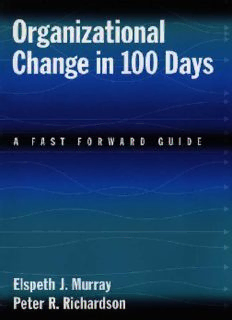
Organizational Change in 100 Days: A Fast Forward Guide (Accompanying Guide) PDF
Preview Organizational Change in 100 Days: A Fast Forward Guide (Accompanying Guide)
Organizational Change in 100 Days ORGANIZATIONAL CHANGE IN 100 DAYS A Fast Forward Guide Elspeth J. Murray and Peter R. Richardson OXFORD UNIVERSITY PRESS 2003 OXFORD UNIVERSITY PRESS Oxford New York Auckland Bangkok Buenos Aires Cape Town Chennai Dar es Salaam Delhi Hong Kong Istanbul Karachi Kolkata Kuala Lumpur Madrid Melbourne Mexico City Mumbai Nairobi Sao Paulo Shanghai Taipei Tokyo Toronto Copyright © 2003 by Oxford University Press, Inc. Published by Oxford University Press, Inc. 198 Madison Avenue, New York, New York, 10016 www.oup.com Oxford is a registered trademark of Oxford University Press All rights reserved. No part of this publication may be reproduced, stored in a retrieval system, or transmitted, in any form or by any means, electronic, mechanical, photocopying, recording, or otherwise, without the prior permission of Oxford University Press. Library of Congress Cataloging-in-Publication Data Murray, ElspethJ., 1961- Organizational change in 100 days : a fast forward guide / Elspeth J. Murray and Peter R. Richardson, p. cm. A guide to the author's Fast forward. 2002. ISBN 0-19-515312-X(pbk.) 1. Organizational change. 2. Strategic planning. I. Title: Organizational change in one hundred days. II. Title: Fast forward guide. III. Richardson, Peter R., 1947- IV Murray, Elspeth J., 19 61 - Fast forward. V Title. HD58.8.M87532003 658.4'02—dc21 2002034903 9 8 7 6 5 4 3 21 Printed in the United States of America on acid-free paper Contents Introduction 1 Section 1 Designing and Leading the Process 5 Section 2 Diagnosing the Change 21 Sections Establishing the "10 Winning Conditions" 35 Section 4 The 100-Day Action Plan 79 Section 5 The Second 100 Days Action Plan 101 This Guide outlines a way of thinking and an approach for implementing deep organizational change. It is to be used in conjunction with Fast Forward: Organizational Change in 100 Days, by Elspeth J. Murray and Peter R. Richardson (New York: The Oxford University Press, 2002). Introduction This Guide has been created to assist executives in thinking systematically about their organizational change activities, in diagnosing the effectiveness of these initiatives, and in developing specific actions to improve the process and accelerate the pace of change in their organizations. The starting point for users of the Guide is the recognition that a new strategy or major change is required for your organization and that it needs to happen quickly. There may be little awareness of this need in the organization or, alterna- tively, changes may have already commenced and you can then use the Guide to evaluate existing approaches and find ways in which they can be improved. 1 The Guide has been developed around the "10 Winning Conditions' for organizational change necessary for success: 1. Correct diagnosis of the change challenge 2. Early development of shared understanding 3. Enrichment of shared understanding 4. A sense of urgency 5. A limited and focused strategic agenda 6. Rapid strategic decision-making and deployment 7. A human flywheel of commitment 8. Identification and management of sources of resistance 9. Follow-through on changing organization enablers 10. Demonstrated leadership In addition, the Guide is based on a number of proven principles: Q There is no single recipe for success—no "silver bullet." Q A sound strategic planning process is the vehicle for driving change efforts. Q Successful organizational change requires speed and momentum. ORGANIZATIONAL CHANGE IN 100 DAYS 2 The Guide commences with a section intended to ensure that a focused strategic plan exists. Section 1 is based upon chapter 3 of the book, "Taking Action." The initial activity in this section is a ten-point assessment of the organization's current strategic planning process. This is followed by section 2, which provides the user with an opportunity to define the organizational change challenge. Section 3 is focused on describing how the ten winning conditions can be established. This section should be used in conjunction with chapter 2 of the book, "Establishing the Winning Conditions." Sections 4 and 5 provide a framework for developing initial 100- and 200-day action plans. INTRODUCTION 3
Description: